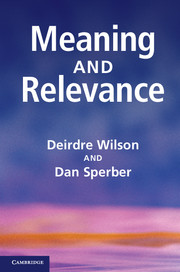Book contents
- Frontmatter
- Contents
- Figures
- Tables
- Preface
- Acknowledgements
- 1 Introduction
- Part I Relevance and Meaning
- 2 The mapping between the mental and the public lexicon
- 3 Truthfulness and relevance
- 4 Rhetoric and relevance
- 5 A deflationary account of metaphors
- 6 Explaining irony
- Part II Explicit and Implicit Communication
- Part III Cross-Disciplinary Themes
- Notes
- References
- Index
3 - Truthfulness and relevance
Published online by Cambridge University Press: 05 June 2012
- Frontmatter
- Contents
- Figures
- Tables
- Preface
- Acknowledgements
- 1 Introduction
- Part I Relevance and Meaning
- 2 The mapping between the mental and the public lexicon
- 3 Truthfulness and relevance
- 4 Rhetoric and relevance
- 5 A deflationary account of metaphors
- 6 Explaining irony
- Part II Explicit and Implicit Communication
- Part III Cross-Disciplinary Themes
- Notes
- References
- Index
Summary
Introduction
Here are a couple of apparent platitudes. As speakers, we expect what we say to be accepted as true. As hearers, we expect what is said to us to be true. If it were not for these expectations, if they were not often enough satisfied, there would be little point in communicating at all. David Lewis (who has proposed a convention of truthfulness) and Paul Grice (who has argued for maxims of truthfulness), among others, have explored some of the consequences of these apparent platitudes. We want to take a different line and argue that they are strictly speaking false. Of course hearers expect to be informed and not misled by what is communicated; but what is communicated is not the same as what is said. We will argue that language use is not governed by any convention or maxim of truthfulness in what is said. Whatever genuine facts such a convention or maxim was supposed to explain are better explained by assuming that communication is governed by a principle of relevance.
According to David Lewis (1975), there is a regularity (and a moral obligation) of truthfulness in linguistic behaviour. This is not a convention in Lewis’s sense, since there is no alternative regularity which would be preferable as long as everyone conformed to it. However, for any language £ of a population P, Lewis argues that there is a convention of truthfulness and trust in £ (an alternative being a convention of truthfulness and trust in some other language £´):
My proposal is that the convention whereby a population P uses a language £ is a convention of truthfulness and trust in £. To be truthful in £ is to act in a certain way: to try never to utter any sentences of £ that are not true in £. Thus it is to avoid uttering any sentence of £ unless one believes it to be true in £. To be trusting in £ is to form beliefs in a certain way: to impute truthfulness in £ to others, and thus to tend to respond to another’s utterance of any sentence of £ by coming to believe that the uttered sentence is true in £.
(Lewis 1975/1983: 167)- Type
- Chapter
- Information
- Meaning and Relevance , pp. 47 - 83Publisher: Cambridge University PressPrint publication year: 2012
- 5
- Cited by

